Review: The Lowdown, “Pilot” & “The Devil’s Mama” | Season 1, Episodes 1 & 2
Reservation Dogs meets neo-noir in Sterlin Harjo and Ethan Hawke’s endearingly shaggy new Oklahoma-set mystery series

Welcome to Episodic Medium's coverage of FX's The Lowdown. As with all of our reviews, this first is free for all, but subsequent reviews are exclusively for paid subscribers. Until 9/30, yearly subsciptions are 20% off for the last time as part of our subscription drive. To learn more, see our full Fall Schedule.
For the past few years, every three months or so, I’ve driven from my home in central Arkansas to Tulsa, Oklahoma, where one of my kids is a college student. I dig Tulsa. Like a lot of cities in deep red states, it’s a place where regional weirdos and lefties can find welcoming arms. Tulsa is also steeped in Americana: dust bowl ballads, indigenous culture, Route 66, and strip malls. So many strip malls.
As a fan of Sterlin Harjo’s peerless TV series Reservation Dogs, I fully expected his latest project The Lowdown to be smart, funny and grounded in fine Oklahoman detail. Sure enough, in the first two episodes, there are multiple nods to cultural giants who, at some point, called Oklahoma home. Pulp novelist Jim Thompson (born in the territory that would later become Oklahoma), poet and painter Joe Brainard (raised in Tulsa), western swing pioneer Bob Wills (who found fame via a Tulsa radio show), singer-songwriter JJ Cale (from Oklahoma City), jazz legend Chet Baker (born in Yale, OK)… all of these either get name-checked or featured on the soundtrack.
But the moment I knew I was in the right hands with Harjo was the first time in The Lowdown that its protagonist heads home. Ethan Hawke (also one of the show’s producers) stars as Lee Raybon, based on the real-life Tulsa “truth-storian” Lee Roy Chapman, a part-time journalist whose digging around in the public archives helped expose some unsavory aspects of Oklahoma history. Chapman also owned a used bookstore, just like The Lowdown’s Lee does. In the show, Lee’s store, Hoot Owl Books—also his apartment—sits in a strip mall next to a tax attorney’s office, which is next to an indie record shop, which is next to an all-night diner. In my Tulsa experience, all that’s missing here is a medical marijuana dispensary, a “health spa,” and a taqueria that looks sketchy as hell but serves the best carnitas you’ve ever tasted.
Premise-wise, The Lowdown is very much in the scruffy neo-noir tradition. At Touch Of Vinyl records (located next to Sweet Emily’s! two doors down from Hoot Owl!), the “RIYL” for this series would include The Long Goodbye, Chinatown, The Big Fix, Night Moves, The Big Lebowski, Zero Effect, Devil In A Blue Dress… I could go on. Like the detectives in those movies, Lee Raybon is the kind of doggedly insistent snoop who gets under the skin of the people in power, even though he himself lives like a mendicant.

Before the start of The Lowdown’s first chapter (titled “The Sensitive Kind”), Lee has stirred up a scandal with one of his latest articles, which explores the sordid private lives and predatory business dealings of the Washberg brothers: the eccentric Dale (Tim Blake Nelson, a Tulsa native!) and the politically ambitious Donald (Kyle Machlaclan). After the article runs, Dale’s found dead in his study, with what looks to be a self-inflicted gunshot wound—although Lee doubts that it was actually suicide. He’s even more skeptical after he drops by the Washbergs’ estate sale and finds a “trust no one” note from Dale, slipped into a paperback copy of Texas By The Tail.
The plot picks up steadily from there, following multiple threads. While trying to interest the Tulsa-based Heartland Press in a follow-up piece about the Washbergs, Lee is also chasing another story, about a company called Akron Construction that has been buying up Black-owned businesses. He’s also dealing with the fallout from another story, published in Tulsa Beat, an alt-weekly which makes most of its money from sex worker ads. This article names and shames some local white supremacists, who are violently angry about being outed.
In classic neo-noir fashion, these stories seem to be connected. Donald Washberg, who’s running for governor, is cozy with Akron’s big boss, Frank Martin (Tracy Letts, a Tulsa native!). And one of Akron’s shady associates, Allen Murphy (Scott Shepherd), contracts out the firm’s dirty work to two of Lee’s skinhead enemies, Berta (Johnny Pemberton) and Blackie (Eric Edelstein). Early in “The Sensitive Kind,” Berta and Blackie break into Lee’s Hoot Owl apartment, to beat him up for the Tulsa Beat exposé. At the end of the episode, these two thugs kidnap Lee and bring him to Murphy, apparently to punish him for making trouble for Akron.
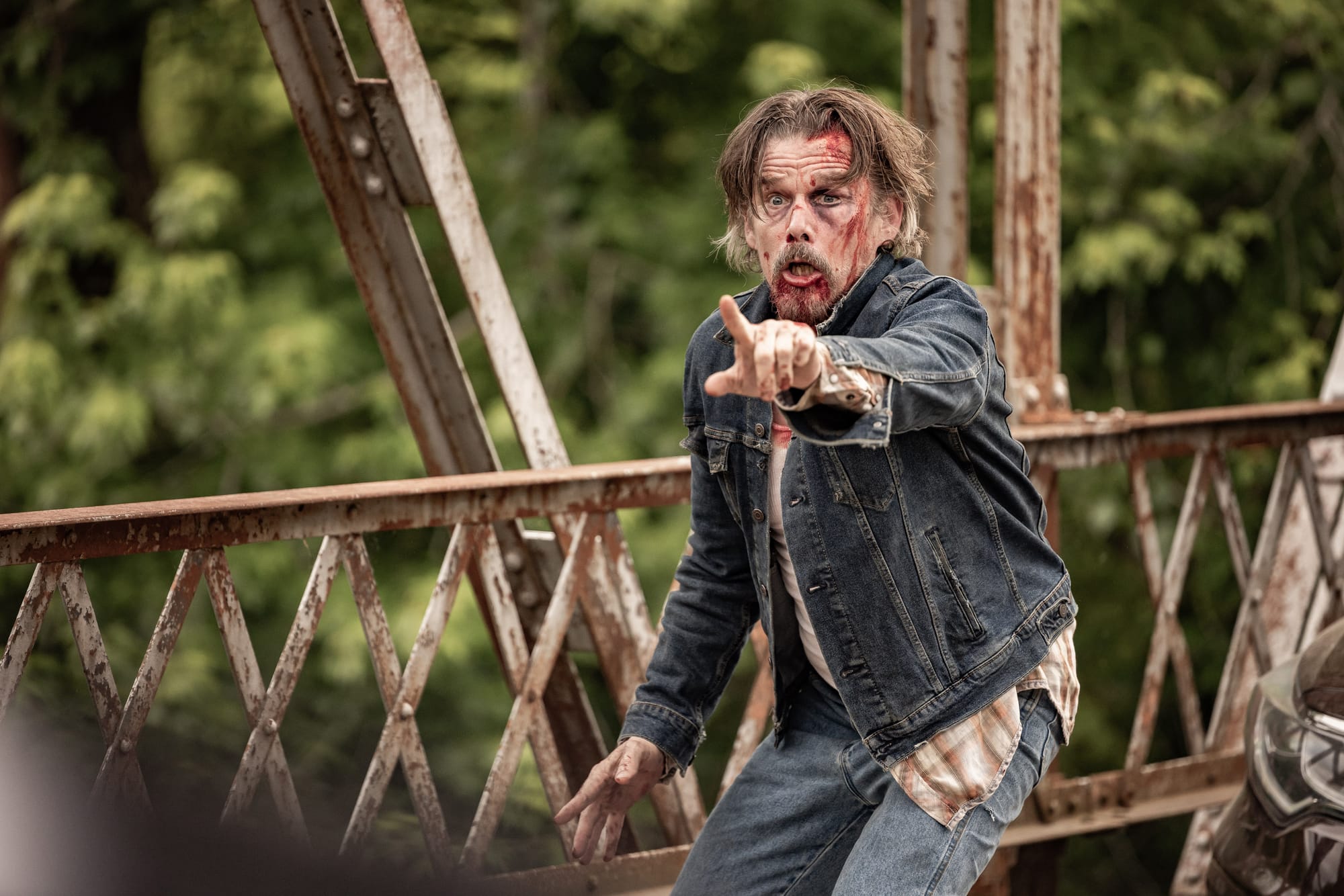
Instead, Murphy—who has no idea Lee’s in the trunk of Berta and Blackie’s car—shoots the bigots on a remote backroad and dumps their bodies over a bridge. We’ll come back to this later.
“The Sensitive Kind” feels loose and relaxed, yet Harjo (the episode’s credited writer and director) packs a lot of information into an hour. We learn that Lee has a doting daughter, Francis (played by the incredible young actress Ryan Kiera Armstrong, recently seen in Star Wars: Skeleton Crew), and that he’s still on good terms with his ex-wife Samantha (Kaniehtiio Horn, Reservation Dogs’s “Deer Lady”). He also owes money and favors to nearly everyone he knows.
Harjo introduces all of the relevant characters in scenes that are structured and performed like amusing little playlets, with Hawke’s Lee at the center of each of them, talking nearly non-stop. He riffs with Ray (Michael Hitchcock), an antiques dealer who knows all of Tulsa’s bigwigs (and their secrets). He riffs with his attorney neighbor Dan Kane (Macon Blair), who he relies on to stash any illicit goods that end up in his possession. He riffs with Cyrus (Killer Mike), Tulsa Beat’s one-eyed editor, who gives him a gun for protection (but no bullets). He riffs with Sally (Rachel Crowl), the trans woman who works the counter at Sweet Emily’s. And he riffs with Marty (Keith David), a fan of Lee’s writing who is also, unfortunately, the Washbergs’ private investigator.
It’s Marty who ends up freeing Lee from the trunk of the car at the end of “The Sensitive Kind,” after which Lee immediately flees the scene. In that car, Lee finds a copy of Mein Kampf in the glove compartment and an envelope full of money stashed above the driver’s side visor. In chapter two, “The Devil’s Mama” (again directed by Harjo, from a script credited to Sneha Koorse), Lee makes use of his sudden windfall, spreading stacks of cash around Tulsa while also trying to learn more about Allen Murphy’s relationship to Berta and Blackie.
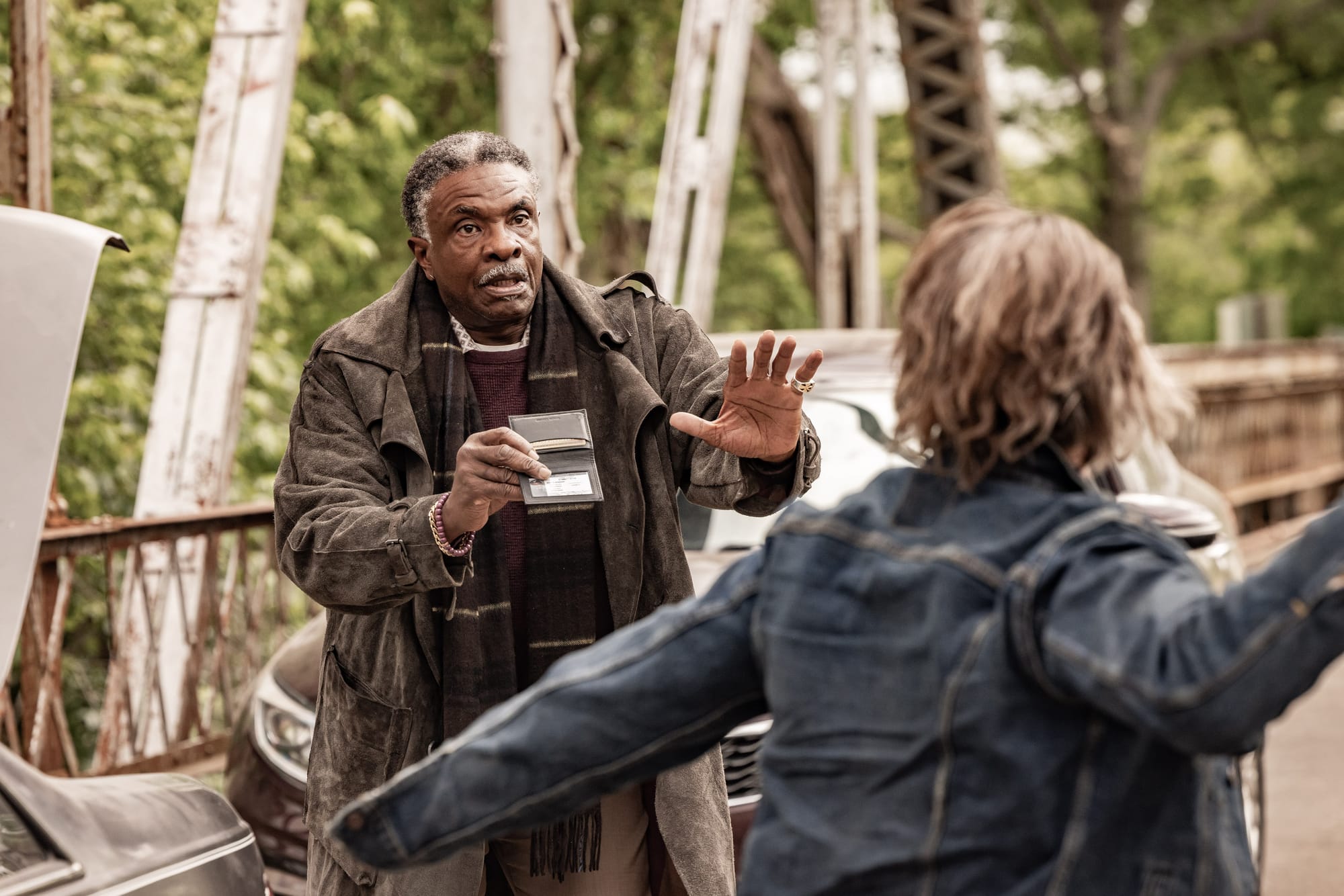
The Lowdown is both a very shaggy mystery story and also a wry comedy. As was the case with Reservation Dogs, Harjo’s characters here aren’t quippy. But they do tend to be funny in a low-key, natural way, just by being themselves. Harjo finds the humor in characters who are stubbornly single-minded, and likes setting these types against each other.
To that end, “The Sensitive Kind” introduces Waylon (Cody Lightning), the fast-talking ex-con cousin of Hoot Owl Books’ laconic, chronically underpaid clerk Deidra (Siena East). In need of some kind of employment to satisfy the terms of his probation, Waylon takes a job as the store’s security guard after Lee gets assaulted, even though Lee: 1. can’t pay him; and 2. finds Waylon annoying. (It doesn’t help that Waylon calls Lee “pedo,” because of Lee’s creepy-looking white van.)
Waylon’s comic potential starts paying off in “The Devil’s Mama,” especially when Lee tries to get him to ditch the white supremacists’ car. A simple request—just get rid of it! chop it up!—turns into an increasingly hilarious running gag wherein Waylon tries to find some way to turn the car into money, despite Lee’s express instructions that it needs to disappear. Eventually, Waylon and his cousin Henry (Jude Barnett) set fire to the car, using it as a rap video backdrop. I love this dude.
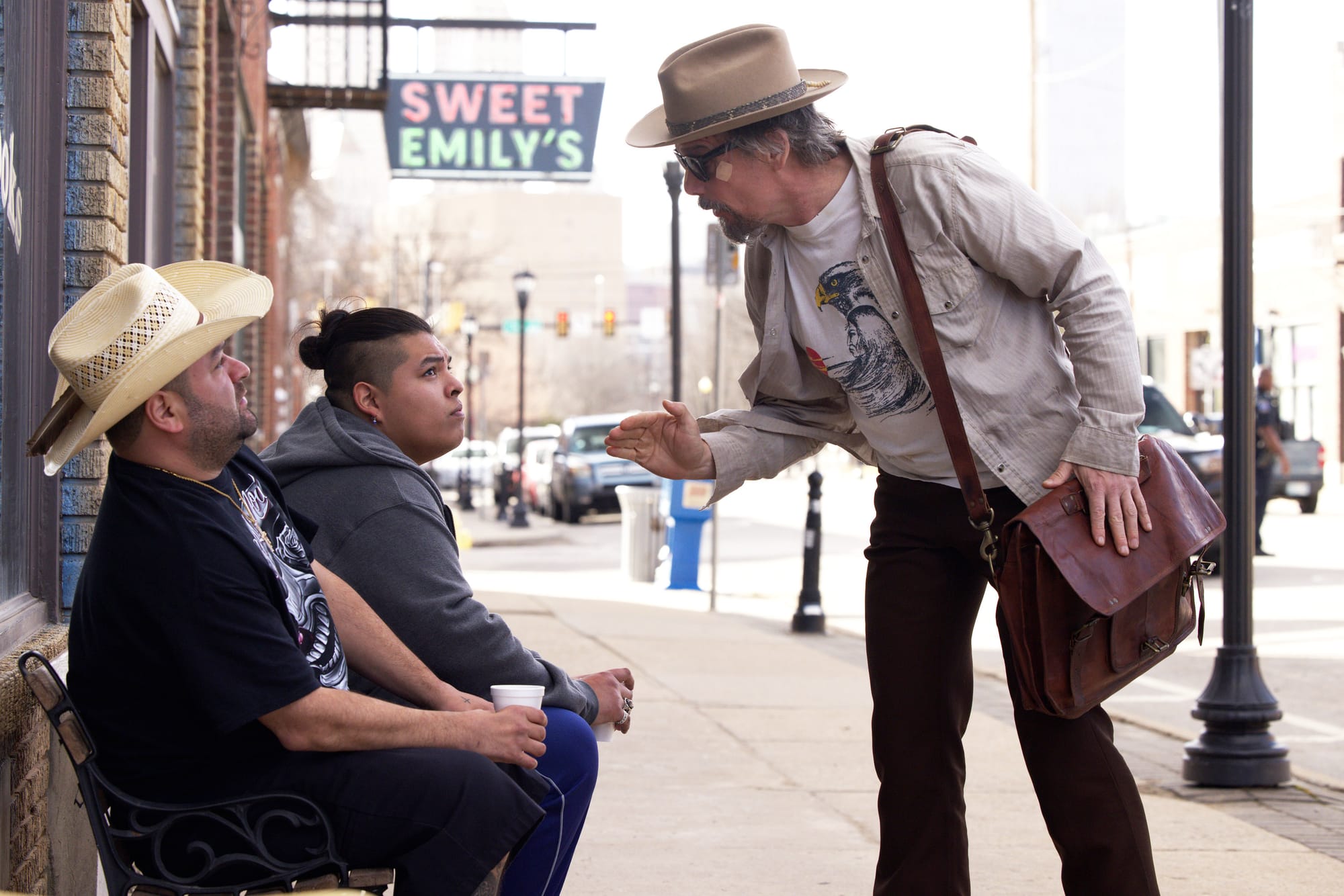
On the whole, “The Devil’s Mama” is less plot-driven than the series premiere—in part because it’s about 12 minutes shorter—though it too is so genial and so ambling that it’s easy to miss how much story is actually there. The episode is anchored by two long scenes, one of which feels, for now, like a quirky digression—but which may eventually become relevant.
The scene involves Blackie’s mother Bonnie (Dale Dickey), who Lee goes to see in hopes of learning more about the late racist’s business ties. Lee wears a skinhead hat, rolls up his sleeves to show off his (“ironic”) confederate flag tattoo, and compliments Bonnie’s David Allan Coe poster. He also lies about having met Blackie “in lockup,” where Blackie taught him to “respect my mama.” Bonnie doesn’t have much to tell Lee that’s helpful, but it’s touching when she offers Lee a Hot Pocket and sweet tea, and it’s heartbreaking when she describes Blackie’s criminal past as “the Devil’s always chasin’ him.” (There’s “a spiritual war goin’ on,” she warns, ominously.)
The episode’s much splashier extended sequence comes at the end, when Lee attends Dale Washberg’s funeral. Held at a Black church—with plenty of TV cameras present, to catch Donald getting all emotional about his brother’s childhood love for “Black boys and Indian kids”—the ceremony eats at Lee, who eventually corners Donald in the bathroom to accuse him of rank villainy. Their argument spills out into the crowded reception era, where Donald rips off Lee’s clip-on tie while Lee calls him a racist and stars singing, “John Brown’s Body.”
Outside the church, Marty—who tries during the funeral to get Lee to back off—gets irritated at Lee accusing him of selling out to “the Man.” This is a very particular needle that The Lowdown takes care to thread, involving Lee’s “white savior” tendencies. Both Marty and Cyrus, separately, makes jokes about how there’s nothing sadder than “a white man who cares.” And when Lee tells Cyrus the story of how Marty saved him from the trunk, Cyrus calls it “Magical Negro bullshit” and suggests he stop smoking dope and watching The Legend Of Bagger Vance. Lee’s good company, but he can be awfully self-righteous, saying things like, “The first time FDR heard the name Adolf Hitler he knew the reason he was born,” in reference to his grudge against the Washbergs.
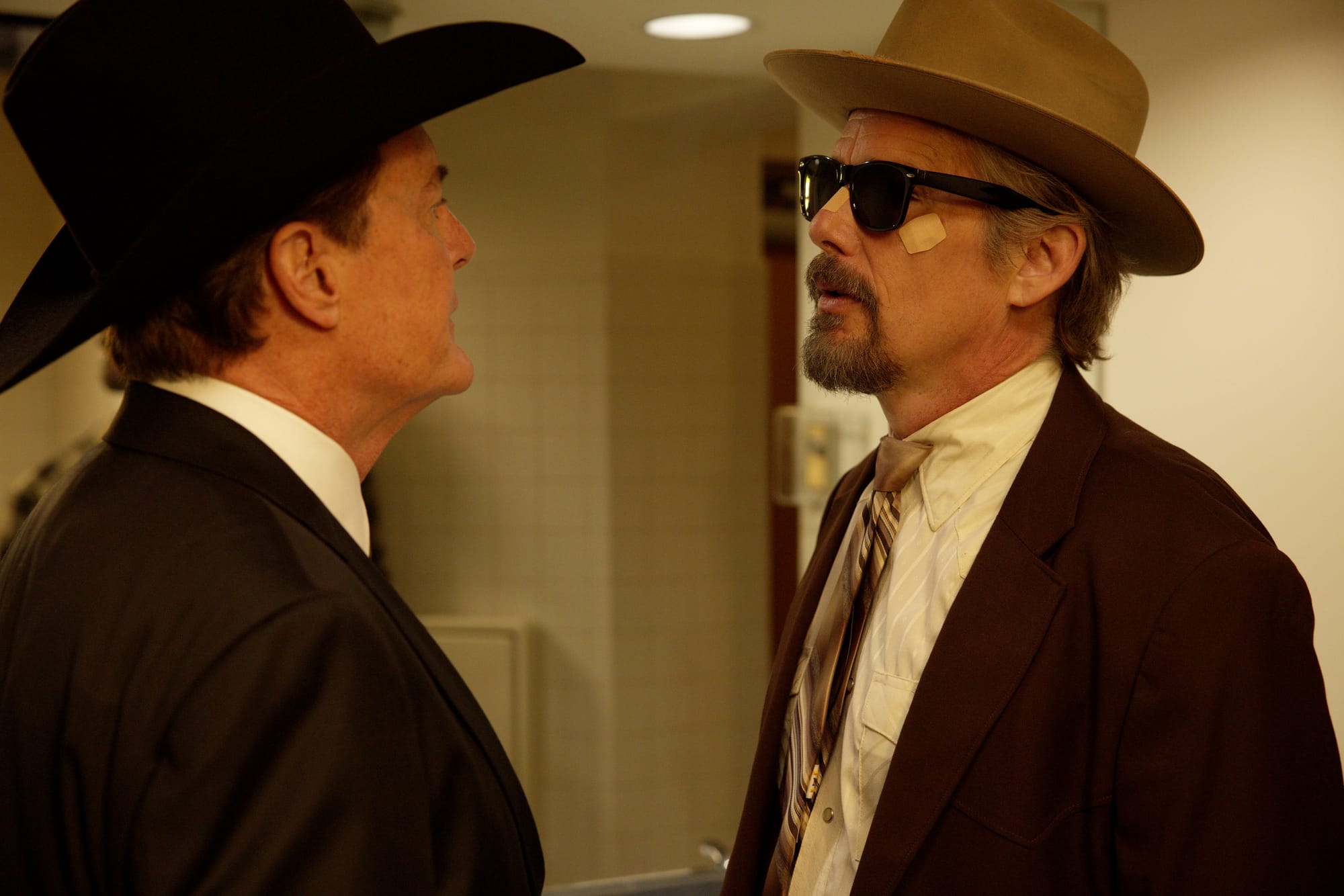
I’m not concerned that Lee will become unlikable as this season rolls on. I’m more concerned that Harjo and company might not have enough plot for eight episodes. Critics were provided with just five Lowdowns in total, prior to the premiere. (I’ve only watched these first two.) This is probably just due to the last three not being done yet. But it does make me wonder if all of the early raves would be as glowing if critics had been able to see the whole season. With mysteries, endings matter.
Still, based on the first two episodes, it’s not like The Lowdown needs to be all that densely plotted. This show is a vibe as much as it is a detective story. It’s like what Francis says about her dad’s Heartland Press article. The subject matter is grim, but she likes it, because to her it feels like listening to Lee deliver one of his little monologues to her about Tulsa—the bad, the good, and the history no one likes to talk about. The article is earnest, honest, and entertaining. So—so far—is The Lowdown.
Stray observations
- Welcome to Episodic Medium’s weekly Lowdown coverage! I was excited to draw this assignment, given my love of Harjo and Hawke, my love of this particular genre, and my personal experiences with Tulsa. We’re going to have a lot to talk about in the weeks ahead.
- In addition to Chet Baker being an Oklahoman, the inclusion of one of his songs on episode one’s soundtrack could be a nod to Hawke’s filmography, and his performance as Baker in the 2015 movie Born To Be Blue. (While we’re on the subject of possible sideways homages, Hawke also played John Brown, in the 2020 TV miniseries The Good Lord Bird.)
- It’s not particular to Tulsa per se to have Cyrus drinking out of a giant QuikTrip cup or Lee stopping at a gas station that serves Hunt Brothers Pizza, but still… I don’t see these logos on TV often, and as a resident of the region, I got a kick out of them.
- There’s one other major character we need to introduce: Betty Jo Washberg (Jeanne Tripplehorn, a Tulsa native!), Dale’s widow, who prepares to meet mourners at his estate sale by drinking margaritas through a glass straw and muttering “he was a good man… thank you for your concern” into a mirror over and over. In Dale’s final note he says not to trust her. Given that she’s sleeping with Donald, I’d say that’s good advice.
- We should also expect more to be revealed about Dale’s kinky sex life, alluded to by the leather bondage gear found in his study. “My family thinks I’m spent meat,” he complains in his note, adding they “don’t appreciate my way of living.”
- I could fill these strays with bits of Waylon dialogue, but my favorite line of his may be when he says that no one fucks with Indian Mafia, before adding, as a correction, “One gang tries to fuck with us. Deadly Natives.” (Cousin Henry is a Deadly Native, yet, “We’re ops and shit, but we’re still family.”)
- Neither Waylon nor Cyrus are impressed by Dale getting kidnapped and thrown into a trunk. Waylon: “You’re a grown-ass man! Throw hands!” Cyrus: “How does an adult with a gun get stuck in a trunk. Don’t you know about the lever?”
- I hope Berta and Blackie turn up again in flashbacks because Pemberton and Edelstein are hilarious, especially when they’re whining at Lee about calling them skinheads in print. (“I’m not bald no more,” Berta gripes. “Great disguise,” Lee says.)
- Deidra can’t figure out why her Hoot Owl paychecks keep bouncing, given that people come into the shop all the time. Lee explains, “Selling used copies of On The Road and Catcher In The Rye does not pay the bills.”
- I didn’t touch on MacLachlan’s character or his performance in this review, so I’m looking forward to talking later about this politician whose entire platform seems to rest on how much Oklahomans love oil and beef.
- Waylon, on why he’s hesitant to get rid of the car: “We could use this! We got court cases and shit!”

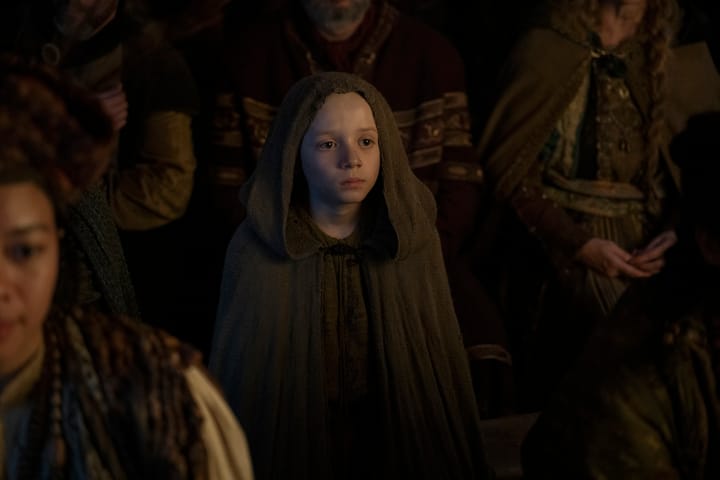

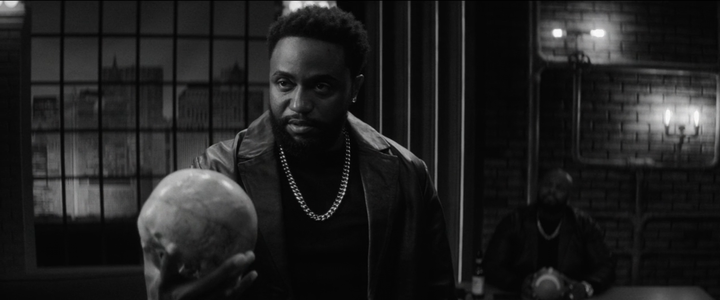
Comments ()